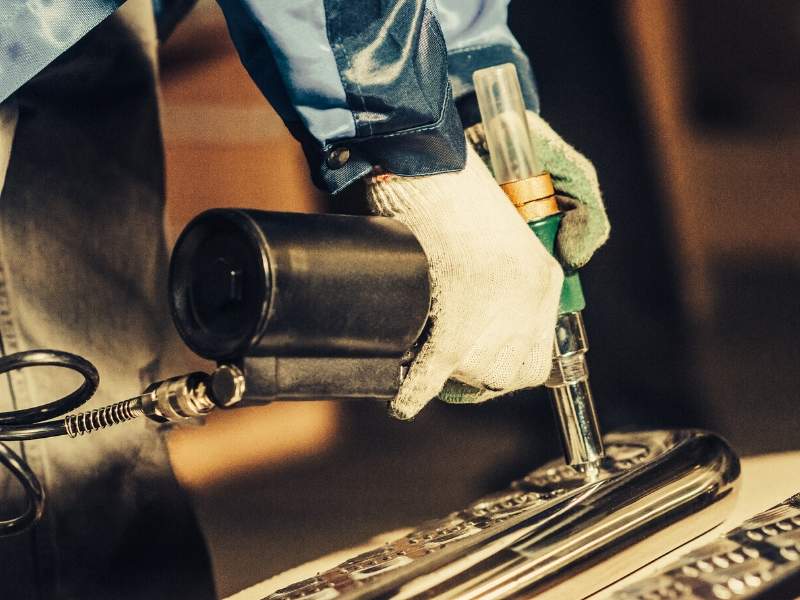An air compressor works best in a properly-ventilated area at ambient temperature as required by the compressor. The fuel in the air compressor may become sludge during the winter. When that happens, the thick fuel requires more energy to operate and this results in performance issues.
Many homeowners use air compressors for a wide variety of projects. But it’s important to know how to care for them properly for the best service over the longest time. If this interests you, we invite you to continue reading to learn how to prepare and maintain your air compressor during the cold winter months.
Guidelines for Air Compressor Winter Prep & Operation

How Cold Weather Affects an Air Compressor
Before you learn the solutions to a problem, let’s first go over what might happen if maintenance falls behind. Moreover, following these guidelines allows for better resolution and prevention of repeating issues.
◙ Frozen Fluids
The oil in the air compressor may not completely freeze, but the flow will slow down in extremely cold temperatures. The condensates in the pipes, when frozen, prevents the machine from operating normally and hampers drainage.
◙ High Power Usage
When the oil inside the tank becomes sludge, it does not flow smoothly. In order to make the fuel flow properly, the machine will use more electricity than usual. The result is high energy costs and frequent circuit breaks.
◙ Breakage
Liquid expands when it freezes. But, when the liquid expands, it may cause breakage, bowing, and holes in the pipes. Then you have to replace the pipes and that gets expensive.
◙ Corrosion
An air compressor generally removes excess moisture from its system that was created by the compression. But this may not be the case during those winter days which eventually leads to the corrosion of system components.
How to Prepare an Air Compressor for Winter

Just because an air compressor is affected by severely cold temperatures doesn’t mean you can’t use one in winter. It is possible to run an air compressor without it breaking down during the cold months.
So, don’t deter from investing in an air compressor for the winter. You may want to check out the Able air compressor sales if you are considering replacing or buying one.
Next, let’s learn about how to take care of your unit this winter without the issues listed above.
◙ Bring it Indoors
It is too harsh to let your air compressor withstand the painful cold outside during the winter months, so why not bring it inside the garage? If you have the equipment inside, it will be doing much better in the milder temperatures of the garage.
Just make sure there is enough space around it for airflow. Additionally, the exhaust must be faced towards a window or door.
According to the experts, it must not be placed in a location having a temperature lower than 45 degrees Fahrenheit. Keeping it inside during winter helps keep it in good repair and operating at normal capacity.
◙ Perform Maintenance Regularly
The best way to prevent your air compressor from experiencing corrosion, blockages, frozen fluids, and high power usage is by sticking to the maintenance routine all winter long.
First, check the lubricants routinely so that they don’t thicken and become useless. By checking and changing them, you prevent high power usage as well as premature wearing.
We recommend that you change the filters of the air compressor every day. Additionally, get either an automatic drainage system or do the daily draining manually. Either way, it helps prevent condensation from freezing the different parts of the equipment.
Inspect for leaks everywhere. Just like the drainage system, you can either choose to check and repair leaks yourself or hire a professional team to do the work for you. Don’t underestimate the power of repairing leaks, because leaks lead to severe energy losses.
◙ Weather-Proof Your Air Compressor
Weather-proofing is probably the best strategy for the operation and maintenance of this machine. To do this, add insulation or a heat source for the external parts of the air compressor.
Your air compressor handles changing environmental conditions by itself with the help of system dryers. These system dryers work to reduce the impact of frozen condensates on the air compressor.
Moreover, you can also use a heater to keep the lubricants runny and to prevent freezing condensates that stop the equipment from running smoothly. To keep the pipes warm, install trace heating in addition to the heater.
Ideally, you should start to prepare for all these procedures two months before the arrival of winter. It is also better to let a professional team inspect your unit before winter.
Final Thoughts
You probably thought that it was impossible to maintain an air compressor during the harsh winter season. Are you not glad to know that you can still use the compressor despite the cold temperature?
This ensures that your school projects, hobbies, crafts, and work won’t be at a standstill because of the cold weather outside. Bring your unit indoors, run maintenance checks every day, and keep the equipment running efficiently by installing a dryer, heater, insulator, or trace heating. Check out this bestofmachinery.com guide will help you select the right air compressor for your needs.
We hope you found this article informative and beneficial. Don’t let the winter prevent you from doing what you love and creating wonders! We’d love to hear from you in the comments below. You will also find other information below for your home and all things design.
All Images Courtesy of Canva.
Other Posts You Might Enjoy:
Launch a Career with your Favorite Hobby
Welding with a MIG Welder; the Advantages & Benefits





